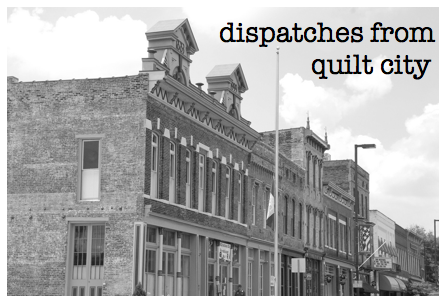Two days ago, the New York Times published a story entitled "The South:For Some, Uncertainty Starts at Racial Identity." The short article features interviews with six Southerners. Now, I use the term interview very loosely because several were done in the parking lots of Wal-mart and Kroger and I'm not sure how in-depth one can get standing next the grocery cart bin. Those interviewed said despicably racist things about Barack Obama and his candidacy and the author of the article used those statements to make assumptions about all Southern voters.
I waited to write about this article because I hoped some of my anger would dissipate. It hasn't. I am still furious.
Now, let me be clear. There are racist people in the South. To say the South has a long, complicated racial history is a bit like saying the Grand Canyon is a hole in Arizona. However, I am extraordinarily tired of people from other regions of the country acting like we have a monopoly on racism. There are racists in every, single state in this country. Racism is institutionalized and it's pervasive. However, that is not the conversation people want to have. It's so much easier to march down to Mississippi, find the first redneck in a baseball hat, and sit in judgement on the racist South. Everybody feels superior to the poor, backwards South and nobody is forced to examine the real complexity of the issue.
While we're at it, I'd like to clear something else up. Not everybody in the South is a racist! I realize this might come as a shock, especially if you partake mass media from time to time, but it's true. Southerners are just as complex as any other group and we are not all the same. Unfortunately, Southerners are one of the few, remaining groups it completely acceptable to stereotype. What if the tables were turned in this article? What if I marched into a predominantly Asian or gay or feel-in-the-blank neighborhood, quoted six people as saying the most stereotypically ridiculous remarks, then made assumptions about the entire group? And made them without quoting a single poll, study, or historical example? How would that go over? I'm guessing not very well.
Of course, the source of the article is another source of the problem. Not to sound like a Pace Salsa commercial, but New York City! Are you kidding me? There is already a lot of animosity between Southerners and what they see as the Eastern elite who look down on them. Needless to say, articles like this don't help.
I'm not asking for pity. I know people don't have a lot of patience for white girls complaining about stereotypes. However, the South is my home and I love it. It's a fierce love based not on delusions about it's perfection or superiority, but on honest respect for its history and what I believe it has to offer. And I do not take kindly to what I see as cheap and easy exploitation of it for a story.
Subscribe to:
Post Comments (Atom)


4 comments:
you go girl!
that's my girl!!!!
love Daddy
First, the very title of the article concedes not all Southerners are racists. "For some,..."
Second, that article was part of several others which reported on troublesome race relations all over the country. Nevada, Colorado, Kentucky, and Mississippi were covered. So your picking this article out of the list and complaining that the South is being pointed at is a bit misleading.
Finally, I am more outraged by what those racists said than I am by them, and by extension, where they're from, being called racist. Those were the worst sort of comments, and I find them wholly inexcusable.
Wow. I have so many swirling thoughts and emotions that I don't know where to start....
I grew up in Appalachia,in far-far-eastern Kentucky. Every few years, some national media outlet would stir up a story about the poverty at home; there was a 60 Minutes story when I was in high school, Rory Kennedy's documentary when I was in grad school, and American Idol's "community outreach" last year. It was heartbreaking to watch the conflict between these "city folks"' perception of the area and the pride which people at home felt. The most dismal instances of poverty, ignorance and addiction were exploited in a manner that indicated that all Appalachians live in this squalor, without regard for the middle-class or well-to-do people nearby. My mom and dad live less than 20 miles from many of the folks shown in all of these programs-- she drives a late-model Volvo, he a 2008 SUV, and they both "teach college classes for fun", beyond their respective employment or retirement. Within a 40 miles radius of their home live coal executives (like former Gov. Patton) and lawyers who own personal airplanes. A home in the same holler which 60 Minutes "exposed" is notorious for having -- I shit you not-- 24 karat-gold faucets and fixtures. Much like the point you raise about the Times' article, it is an example of bad methodology weakening the story.
As a proud Southern girl myself, I never gave a lot of thought to racial issues beyond the general notion that racism is bad, but an unfortunate sterotype. Possibly the worst accusation of racism I ever had to endure was the accusation that all Kentucky fans supported the firing of Coach Smith because he was Black, not because he was a very mediocre coach. Over the past couple years, however, my law school friend Lucie,
has given me an interesting perspective; she is half of an interracial couple who are raising their sons to be intelligent and thoughtful in the face of hateful racism. And she still considers herself a proud Southerner. It is both the burden and the opportunity of our generation -- people like you, me, Lucie, and the thousands of other educated, enlightened Southerners who have the means and opportunity to make our voices heard -- to rectify old stereotypes about the South.
Thanks for the perspective, Sarah. I adore the South as well, and have found living with and battling the accompanying stereotypes to be both a challenge and an opportunity. Nevertheless, as you say, it's my home. :)
xo--
h
Post a Comment